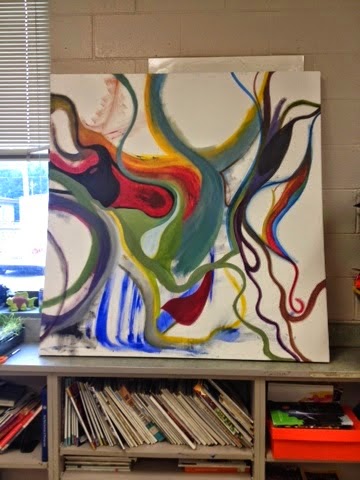by ian sands
Dorothy: Oh, will you help me? Can you help me?
Glinda: You don't need to be helped any longer. You've always had the power to go back to Kansas.
Dorothy: I have?
Scarecrow: Then why didn't you tell her before?
Glinda: She wouldn't have believed me. She had to learn it for herself.
Scarecrow: What have you learned, Dorothy?
Dorothy: Well, I—I think that it, that it wasn't enough just to want to see Uncle Henry and Auntie Em — and it's that — if I ever go looking for my heart's desire again, I won't look any further than my own backyard. Because if it isn't there, I never really lost it to begin with! Is that right?
Glinda: That's all it is!
Scarecrow: But that's so easy! I should've thought of it for you -
Tin Man: I should have felt it in my heart -
Glinda: No, she had to find it out for herself.
I've learned a lot over the last year and it has changed my personal philosophy about teaching art. My old motto was "make art". Now, I'm not so much interested in having students make art but rather making artists. This was a big paradigm shift. It removed the focus from the product and placed the emphasis on the person and the process.
Ariel was a student in my class last semester. She was consistently exploring geometric vs organic shapes through a series of small, acrylic paintings. As her teacher, I wanted to see her push past these exercises. I could have assign her a project but that would have been my solution. Instead, I gave her the materials and instructions for building a 4' x 4 ' canvas.
The newly gessoed canvas outside on the picnic table
Ariel took a few days staring at the canvas. I joked with her that she was afraid of it. To some extent I was right but soon Ariel started painting her organic shapes.
The painting during week one
A few days into the painting, Ariel (in her words) was having a bad day. She took a palette knife and covered the canvas in muddy brown.
The mud after a bad day
The painted remained in this state with Ariel not picking up a paint brush for several days. It was now mid May and I was starting to second guess my teaching. If I had just given her a project, she would already have a successful, completed product.
Then, Ariel changed course. She started cutting out magazine images in geometric shapes and glueing them to the canvas. Next, she applied thick, black organic lines in paint.
Then, Ariel changed course. She started cutting out magazine images in geometric shapes and glueing them to the canvas. Next, she applied thick, black organic lines in paint.
Starting over
Ariel was onto something. Throughout the month and into June, Ariel continued to work on her art. By the end of the school year she had almost completed a well balanced composition that incorporated both geometric and organic characteristics.
Ariel was thrilled with her results as was I. She had spent many weeks not simply painting, but contemplating, struggling, engaging others in conversation and eventually, following her own voice.
Ariel with her painting in June
Any opponent could easily argue against my teaching philosophy. It could be pointed out that Ariel wasted two months on this project. She could have completed at least four teacher-directed projects in the same time. Teacher-lead projects could have also incorporated more concepts with less ambiguity.
If my focus was still on making art, I would agree. However, I believe the process that Ariel went through held the most value. It was something I couldn't tell her.
Scarecrow: But that's so easy! I should've thought of it for you -
Tin Man: I should have felt it in my heart -
Glinda: No, she had to find it out for herself.
...
..
.
...
..
.





I'm with you. Letting her work through her ideas was the best and most valuable way to go. How else will she really find her voice?
ReplyDeleteShe had to find out for herself. Groundbreaking. How can we just assume that if we teach enough projects, the student will become an artist on their own? This questions what it really means to be "An artist"- Is it someone who paints, etc., or is it someone who explores, pushes, creates, struggles and sometimes, breaks through! Wow!
ReplyDelete